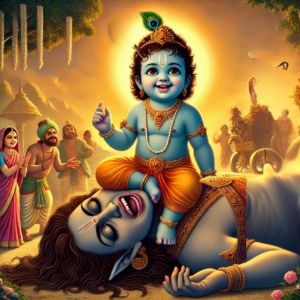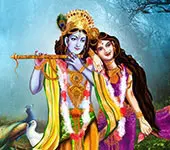Poison Paves the Way for Liberation

Chapter 6 of Skandha 10 begins just after Krishna's birth and joyous celebration in Gokula. While the villagers rejoice, danger brews—Kamsa sends the demoness Putana to kill infants. This chapter marks Krishna's first direct encounter with evil, showing how even destructive forces find liberation through contact with the Supreme.
Nanda returns home from Mathura, haunted by Vasudeva’s warning.
He senses danger in the air, the kind that creeps silently in the dark.
His mind whispers: This was no ordinary dream.
He silently surrenders to Hari — his only refuge.
Somewhere far, in the shadows, Kamsa has already moved his pawn.
A terrifying demoness — Putana — with bloodlust in her eyes,
flies across cities, towns, and cow-villages,
killing infants in their cradles like it were a sport.
Her hunt succeeds only where Krishna's name is unknown,
where ears do not echo Hari’s glories,
where rituals are hollow, and bhakti has dried up.
Those places, she claims as her playground.
One day, soaring unseen in the skies,
Putana lands in Gokula — Nanda’s village — like a hawk in disguise.
With maya as her armor and lustful deceit in her heart,
she cloaks herself as a gentle woman, a caregiver of children.
Her braid is laced with fragrant jasmine,
her hips broad, her waist narrow — sensuality crafted with care.
Gold shimmers from her earrings, her clothes flutter like silken lies.
Her eyes glow, her face shines,
she looks like Lakshmi… but death walks beneath her skin.
Her charming smile, the sideways glances, the slow sway of her steps —
she bewitched the hearts of Vraja’s women.
With a lotus in hand and grace in every move,
she looked like Lakshmi… as if she came to meet her beloved.
Pretending to seek a child, Putana crept into Nanda’s home.
By fate, her eyes fell on Him —
the slayer of her own death — lying quiet on the cradle,
wrapped in softness, blazing like hidden fire.
The all-knowing One — the Soul of all that moves and doesn’t —
understood her true form in silence.
Without opening His eyes, He let her lift Him onto her lap,
like a sleeping serpent being picked up by an unaware fool.
Her mind was fierce, her hands full of deceit.
Yet she looked the part — regal, tender, glowing.
Even Yashoda, nearby, was momentarily deceived.
Her presence overpowered the room like a queen entering unnoticed.
She offered her poisoned breast to the infant.
But Krishna — the wrathful protector — pressed hard with His tiny hands,
as if drawing out not just milk, but her very life.
With calm fury, He sucked the poison, the breath, the soul — all at once.
‘Let go! Let go! Enough!’ — she screamed in agony.
Krishna’s grip crushed every life-vein in her body.
Eyes wide, limbs flailing, sweat pouring —
she thrashed about like a mountain struck by lightning.
Her roar shook the earth, sky, and stars.
Mountains trembled, rivers churned, and people ran in panic,
thinking the thunder of doom had fallen.
With her real form revealed — a giant demoness —
Putana collapsed in the cow-pen like fallen Vrtra,
limbs outstretched, dead, hideous, enormous.
As she crashed, her corpse crushed trees across three yojanas.
The sight left everyone stunned — a terrifying miracle.
Her face had fangs like daggers, a nose like a cave,
breasts like rocky cliffs, and wild red hair scattered.
She looked like death carved from stone and flame.
Her eyes were like bottomless wells.
Her mouth gaped like a cave, arms and legs like stone bridges.
Her navel was a dark, dry pit — terrifying in every way.
The cowherds and their wives trembled at the sight.
Earlier, her death-cry had already split their hearts and ears in fear.
But what did they now see?
On that monstrous chest, Krishna played — calm, unafraid.
The gopis rushed in, overwhelmed with fright and love.
Yashoda and Rohini circled him with sacred rituals,
twirling cow-tails and chanting protective verses.
They bathed him with cow urine, then with sacred cow-dust,
and marked his twelve limbs with names of Bhagavan —
each gesture soaked in protective motherly devotion.
The gopis, their palms wet with holy water,
touched each of Krishna's limbs —
placing protective energies there as if they were their own.
With motherly fingers, they performed bija-nyasa, invoking the sacred syllables.
They prayed —
May Aja guard your feet.
May Achyuta shield your knees and thighs.
Let Yajna protect your hips, Hayagriva your belly.
Keshava at your heart, Ishvara at your chest,
Vishnu at your arms, and Urukrama at your face.
Their love turned into a garland of divine names.
Let Chakra-bearing Hari guard your front,
Mace-wielder behind, Bow and Quiver by your sides.
Shankha at the corners, Upendra above,
Garuda below, and Balarama all around.
Hrishikesha guard your senses,
Narayana your breath.
Mind, let Yogeshwara protect it.
Let Shwetadweepapati rule your thoughts.
Prishnigarbha guard your wisdom,
Bhagavan himself, your Self.
Govinda protect your play,
Madhava your sleep.
Each name was not a word —
but a fortress, a shield, a fire of devotion wrapped around their child.
As he walks, let Vaikuntha guard him.
As he sits, may the consort of Shri protect.
While he eats, Yajna-bhuk should shield.
Let he who strikes fear in all evil planets stand watch.
Their chant rose like thunder against the unseen —
Dakinyas, evil spirits, Kushmandas, and child-snatchers,
ghosts, pretas, pisachas, yakshas, rakshasas, and the sly Vinayakas —
let them all vanish at the sound of Vishnu's name.
Kotara, Revati, Jyeshtha, and Putana,
and those Matrikas who trouble children —
those who cause madness, seizures,
and who attack body, breath, and senses —
may they all melt at his name.
Those who come in dreams, bad omens,
old witches, child-graspers, and all dark forces —
may they be scorched away,
for they tremble at even the whisper of Vishnu’s name.
Sri Shuka concludes —
With this loving shield built of devotion,
the gopis gently nursed him,
and Yashoda laid her child down to sleep —
wrapped not just in a cloth,
but in a fortress of sacred names and boundless love.
Just then, Nanda and the other gopas returned from Mathura.
They saw the massive, lifeless form of Putana —
and were utterly stunned.
Their hearts pounded with disbelief.
They whispered among themselves —
Could this child be a rishi reborn? Or a master of yoga?
An omen like this… didn’t Akrura's brother once warn Vasudeva?
The memory struck them like thunder.
The gopas chopped up the hideous corpse with axes.
They carried the parts far from the village
and set them ablaze,
covered with firewood to hide its monstrous form.
And yet, the smoke that rose from those burning limbs
did not stink of flesh…
it carried the scent of agaru, divine and sweet.
Touched by Krishna’s lips, even poison had turned pure.
That same Putana — eater of infants,
a demoness with rivers of blood on her tongue —
even she, though her intention was murder,
attained liberation by offering her breast to Hari.
If even Putana, who came with poison,
was freed by offering her body to Krishna,
then what of those who serve him with love and faith?
What will they not attain, O King?
She—whose sinful body the Lord climbed upon—
she—whose chest he drank from as if she were his mother—
that same Putana,
attained a place venerated by gods and sages.
If she was liberated, what then of the cows?
They are Krishna’s foster-mothers too—
feeding him milk not with deceit,
but with innocent love and warmth.
The milk they gave him
was soaked in motherly affection.
That Krishna—Devaki’s son—
is the giver of kaivalya and all blessings.
And those gopis who kept their eyes always on Krishna,
their hearts forever absorbed in him—
O King, they never return to this cycle of ignorance.
For them, samsara is over.
A strange fragrance filled the air—
sweet like burning agarwood,
rising from the cremation ground.
The villagers smelled it and rushed back,
wondering what had happened in their peaceful Gokula.
The gopas heard from others—
how a monstrous woman came,
how she died, and how Krishna was safe.
Their hearts calmed,
their minds were stunned by this miracle.
Nanda, the noble-hearted father,
lifted little Krishna in his arms,
smelled his head with love,
and felt joy beyond words—
as if he had received his child back from the jaws of death.
Whoever hears this tale
of Krishna’s wondrous liberation of Putana—
with faith and devotion—
will surely grow in love for Govinda,
the eternal protector of all.
Putana came with poison, but Krishna drank only her karma, not her hatred. Even a demoness, offering her breast with murderous intent, attained the bliss of a mother—such is the boundless grace of Krishna, who turns death into deliverance and hatred into heaven.

English
Bhagavatam
Click on any topic to open
7
30
Astrology
Atharva Sheersha
Bhagavad Gita
Bhagavatam
Bharat Matha
Devi
Devi Mahatmyam
Ganapathy
Glory of Venkatesha
Hanuman
Kathopanishad
Mahabharatam
Mantra Shastra
Mystique
Practical Wisdom
Purana Stories
Radhe Radhe
Ramayana
Rare Topics
Rituals
Rudram Explained
Sages and Saints
Shiva
Spiritual books
Sri Suktam
Story of Sri Yantra
Temples
Vedas
Vishnu Sahasranama
Yoga Vasishta